Key takeaways
- Community life coaching emphasizes collective well-being, fostering growth through shared experiences and mutual support.
- Embracing failure as a valuable teacher allows for personal growth and resilience, transforming setbacks into learning opportunities.
- J.K. Rowling’s story exemplifies the importance of persistence, vulnerability, and maintaining a vision despite challenges.
- Building resilience is supported through community connection, which offers perspective, encouragement, and shared strength in overcoming obstacles.

Understanding Community Life Coaching
Community life coaching, in my experience, is about more than just setting goals; it’s a partnership that nurtures growth within the shared context of our community. Have you ever felt stuck despite having clear plans? That’s where a coach steps in—not to give all the answers, but to help you uncover strengths and opportunities you might have overlooked.
What makes community life coaching unique is its focus on collective well-being alongside individual progress. I’ve seen how this approach not only empowers one person but creates a ripple effect, inspiring others in the community to embrace change and resilience. It’s like being part of a team where each player’s growth lifts everyone else up.
When I first encountered community life coaching, I was skeptical. Could working within a community framework really make a difference to personal challenges? Over time, I realized it’s the shared experiences and mutual support that transform setbacks into valuable lessons—lessons that can’t be learned alone but flourish when we grow together.
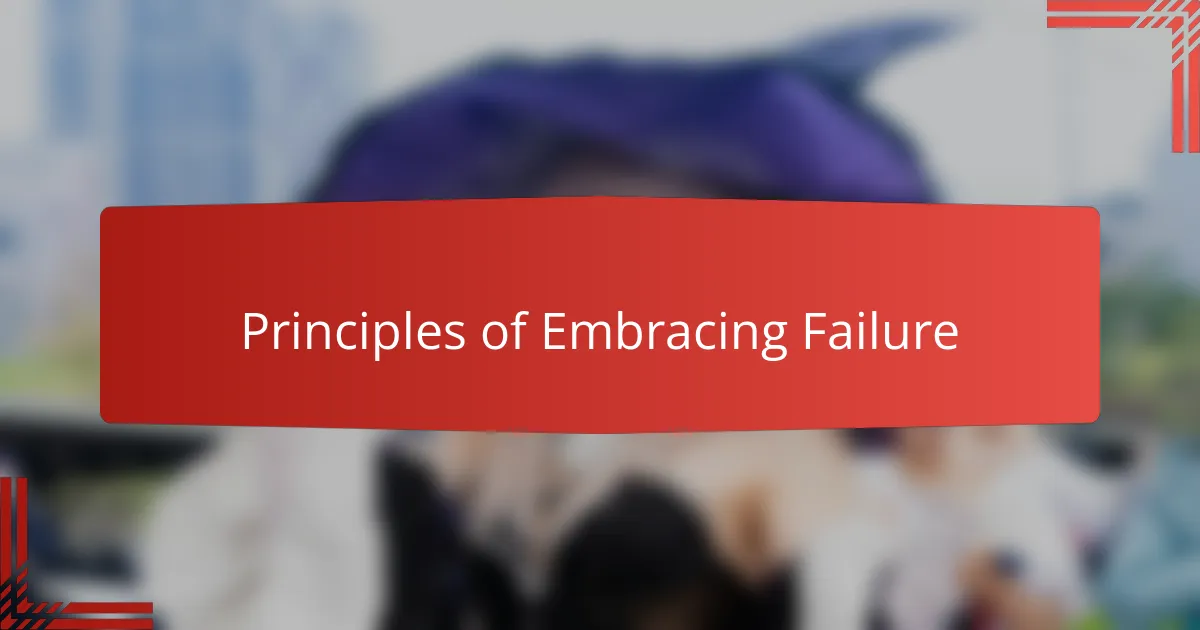
Principles of Embracing Failure
Embracing failure starts with shifting how we see it. Have you noticed how quickly we label setbacks as something negative? I used to do the same, but realizing failure as a valuable teacher changed everything for me. It’s less about the fall and more about what you learn as you get back up.
One key principle is acceptance. I remember the first time I truly accepted a failure without judgment—it felt oddly freeing. Instead of fighting the discomfort, I allowed myself to explore what went wrong and why, which opened doors I didn’t expect. This mindset helped me stop fearing failure and start embracing growth.
Another principle is resilience fueled by curiosity. When something didn’t work out, I asked myself, “What is this experience trying to tell me?” That question shifted my focus from blame to exploration. It’s such a simple shift, but it transformed failure from a dead-end into a stepping stone for future success. Have you tried that yet?
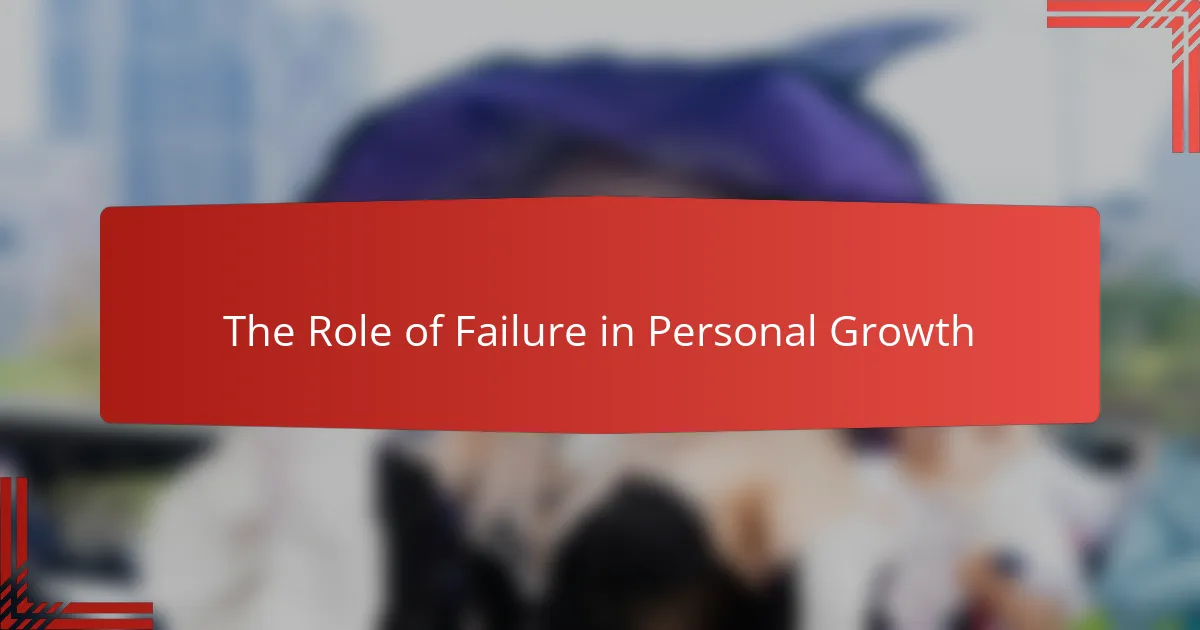
The Role of Failure in Personal Growth
Failure, in my experience, is often the catalyst for profound personal growth. When I faced setbacks, it wasn’t the failure itself that shaped me, but how I responded. Have you ever noticed that those moments pushing you to your limits also reveal strengths you never knew you had?
I recall a time when I stumbled repeatedly on a project and felt completely defeated. Yet, looking back, those missteps forced me to re-evaluate my approach, sharpen my focus, and grow in resilience. Isn’t it fascinating how failure strips away what doesn’t work, leaving space for better ideas to take root?
What’s truly transformative is embracing failure not as an end, but as an essential part of the journey. Each failure taught me something unique—lessons about patience, adaptability, and self-belief—that no success alone could provide. Could personal growth thrive without those messy, imperfect moments? I doubt it.
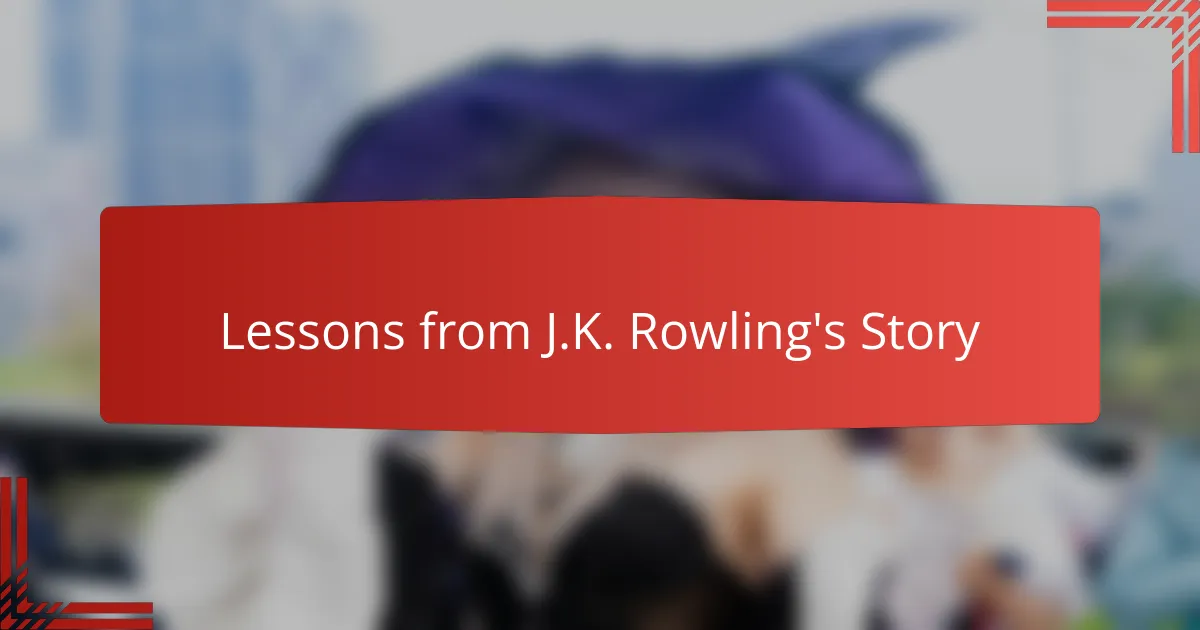
Lessons from J.K. Rowling’s Story
J.K. Rowling’s story taught me that failure isn’t a sign to give up but a stepping stone toward success. When she faced rejection after rejection before publishing Harry Potter, it reminded me how resilience can turn doubt into determination. Have you ever felt like quitting just before a breakthrough? Her journey shows that persistence often matters more than immediate success.
Another lesson I took from Rowling is the power of embracing vulnerability. She has shared how hitting rock bottom helped her rediscover her voice and purpose. I’ve found that allowing ourselves to be vulnerable in tough times can open new paths for growth—paths we might never have explored otherwise. Isn’t it comforting to know that even the most successful people have faced their lowest moments?
Finally, Rowling’s story highlights the importance of believing in your vision, even when others don’t. She held onto her dream despite financial struggles and personal hardships, proving that confidence in your purpose fuels resilience. It made me wonder: How often do we abandon our goals just because the world doubts us? Her experience encourages me to keep faith in my journey, no matter the obstacles.
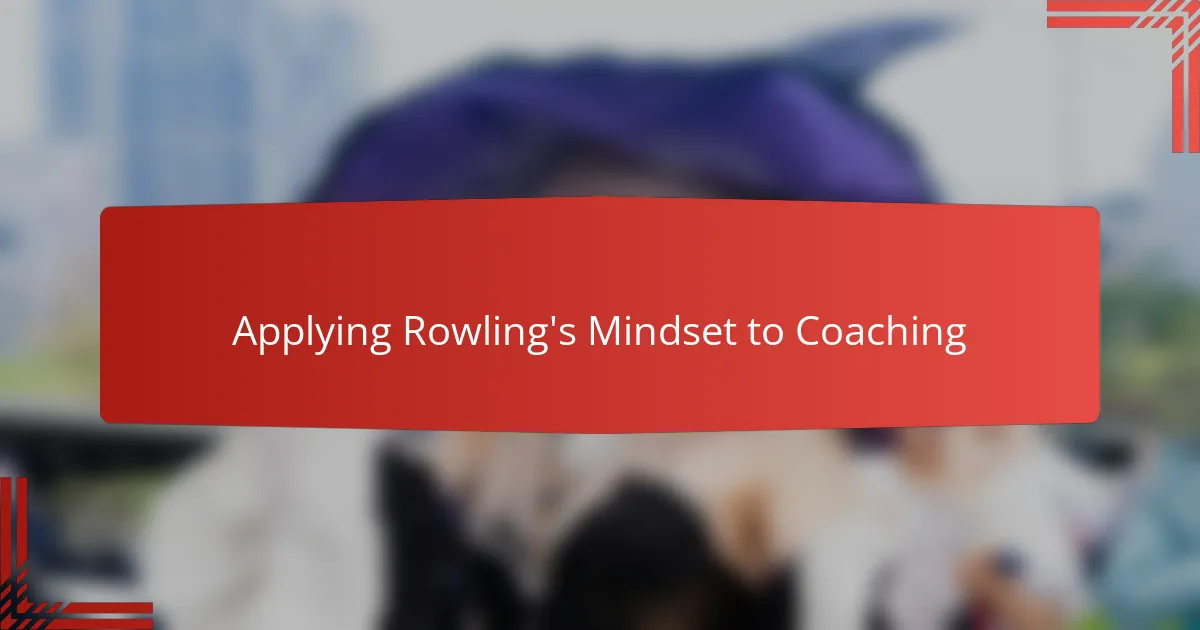
Applying Rowling’s Mindset to Coaching
Applying Rowling’s mindset to coaching means embracing setbacks as powerful learning moments rather than failures. I’ve found that when clients view obstacles through this lens, their resistance softens and they become more open to experimentation and growth. Have you noticed how shifting perspective like this can transform the coaching dialogue into something much richer?
Another aspect I appreciate is the courage to stay vulnerable throughout the process. Just as Rowling shared her struggles openly, I encourage those I coach to share their doubts and fears honestly. This openness creates a safe space where we can explore challenges deeply, turning emotions that feel heavy into fuel for change.
Lastly, holding onto a clear vision even when progress feels slow resonates deeply in coaching work. I’ve seen firsthand how maintaining faith in one’s path—despite external setbacks—helps build resilience and momentum. Doesn’t that remind you how powerful persistence combined with hope can be in achieving meaningful transformation?
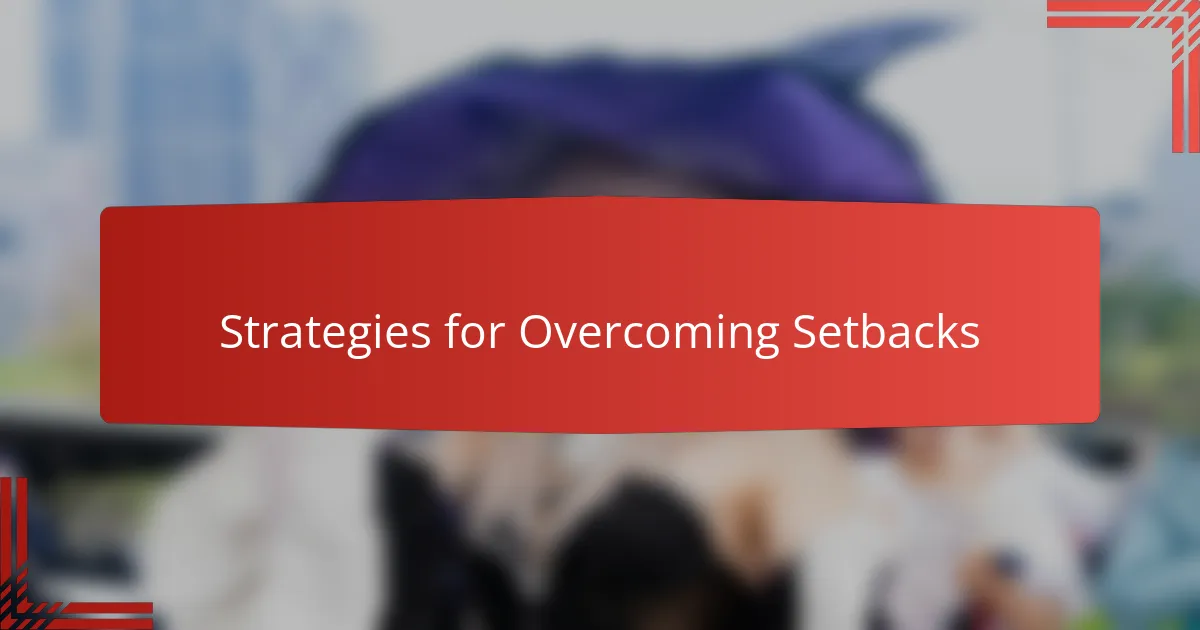
Strategies for Overcoming Setbacks
One strategy I’ve found essential in overcoming setbacks is reframing the narrative we tell ourselves. Instead of seeing a setback as a failure, I remind myself it’s simply feedback—a signpost pointing me toward what needs adjustment. Have you ever noticed how changing just a few words in your inner dialogue can shift your entire outlook? That subtle shift has helped me stay motivated when things felt bleak.
Another approach I rely on is breaking down challenges into manageable steps. When I’m overwhelmed by a setback, I ask myself, “What’s one small action I can take right now?” This keeps me from freezing or giving up. It’s amazing how progress often comes from tiny, consistent efforts rather than giant leaps.
Finally, I’ve learned the power of seeking support, whether through a community coach or trusted peers. Isolating myself was my first instinct when failure hit hard, but opening up made all the difference. Sharing struggles doesn’t weaken us; it strengthens our resilience by reminding us we’re not alone in the journey. Have you found that kind of support to be a game-changer? I certainly have.
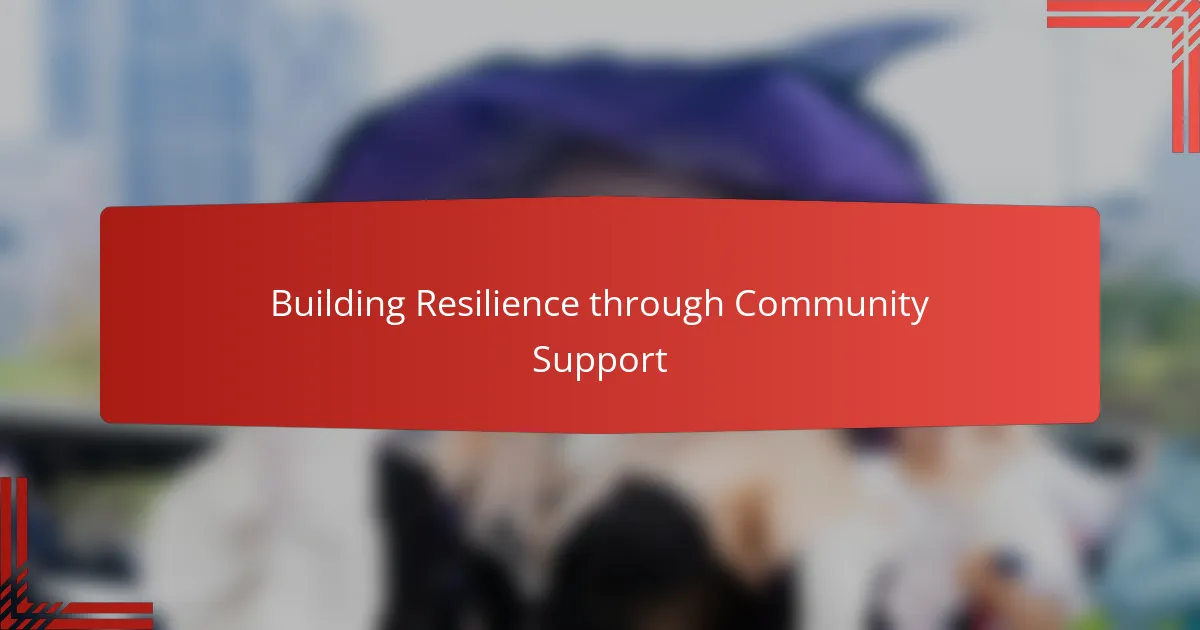
Building Resilience through Community Support
There was a time when I faced a setback that felt isolating, but reaching out to a community coach changed everything. The encouragement and shared experiences I found among others facing similar struggles reminded me that resilience isn’t built in solitude—it’s cultivated through connection. Have you ever noticed how hearing someone else’s story can suddenly make your own challenges feel less heavy?
I’ve also realized that community support provides more than comfort—it offers perspective. When doubt creeps in, trusted voices can help reframe failure as a step forward rather than a dead-end. This collective wisdom has been instrumental for me in staying grounded and moving ahead, especially during moments when giving up feels easier.
What truly stands out to me is how solidarity sparks hope. Together, we celebrate small victories and learn from setbacks, reinforcing a mindset where resilience grows naturally. Isn’t it powerful to belong to a community that lifts each other up, turning individual struggles into shared strength? That sense of belonging has been a cornerstone in my journey toward embracing failure.